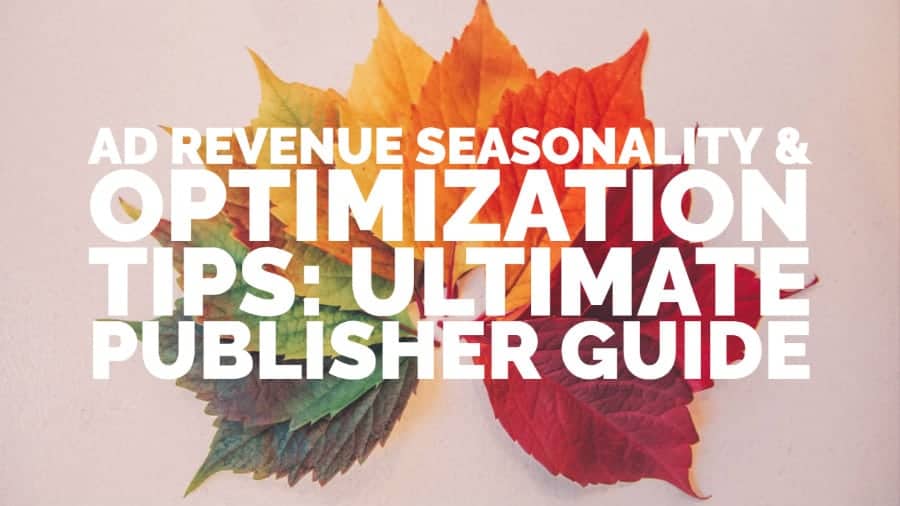
This post was most recently updated on September 19th, 2023
Ever wondered why your ad RPMs fluctuate throughout the year? It can be both frustrating and amazing to experience these fluctuations as a publisher. One moment your ad revenue RPMs might drop, and the next, you might earn your highest ad RPM ever.
It’s all based on a range of factors such as advertiser budgets, consumer trends, and seasonality. In this post, we’ll help you understand ad revenue seasonality and provide you with tips to maximize ad earnings no matter the season.
Advertisers usually approach advertising campaigns and planning in terms of quarters. Each quarter represents a different set of months in a year. It’s represented as follows:
Q1 – January, February, and March
Q2 – April, May, and June
Q3 – July, August, and September
Q4 – October, November, and December
The following is a generalized explanation of advertiser spending during Q1-Q4. Keep in mind that for some niches, this might differ as consumers have different spending patterns, deadlines, and important dates with regards to that niche.
Q1 tends to have a slow start since there is a lot of ad spending that takes place during Q4, which I’ll explain a bit later. Some advertisers start each year or Q1 with a new slate. This could mean new brands to promote, new campaigns, or new products. Often they need to run ad tests to find winning campaigns and don’t commit to spending big before that happens. This could result in less ad spending and also add to lower ad RPMs for Q1.
Q2 is different. Many advertisers or ad agencies’ financial year ends in Q2. They usually try to spend all their budgets, and anything left gets spent during this time. That’s why publishers often have a great Q2 in terms of ad RPMs, especially moving to the end of June.
In Q3, budgets could again be adjusted as some ad agencies, as mentioned in Q2, need to plan for the rest of the year. Publishers might experience some decrease or a slump during early Q3 compared to Q2 ad RPMs.
Advertisers tend to increase budgets to spend more depending on consumer spending and seasonal factors. They want their ad budgets to have the most significant impact. What better way to advertise when consumers are in spending mode or are actively looking to buy things or commit to certain events?
For this reason, ad spending usually increases dramatically during Q4 as Black Friday and Christmas approaches. Often in Q4, publishers experience some of their highest ad RPMs.
The same can be said about other notable dates, holidays, and events such as Valentine’s Day, Easter, Mother’s Day, Halloween, Back to School, Father’s Day and more.
Here is a graph showing the RPM seasonal trends for 2018 compared to 2019 on a month to month basis.
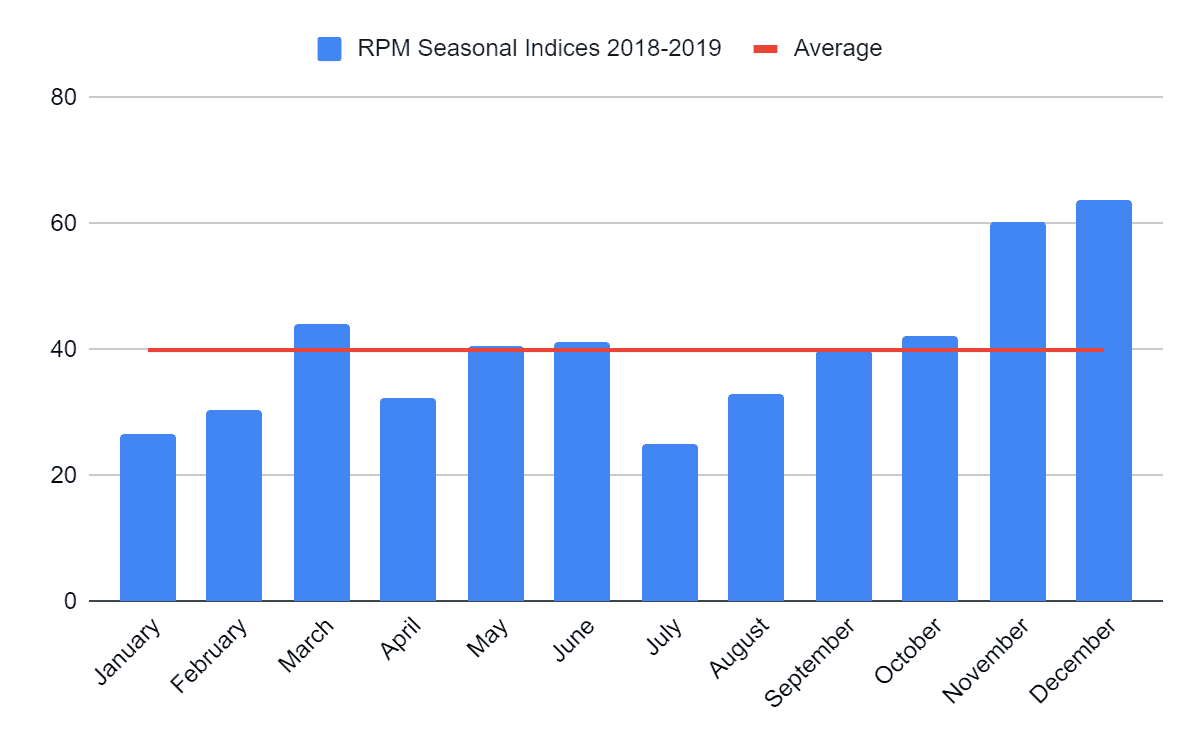
Here is a summary of the different quarters, and how you can optimize to drive the most ad revenue possible.
Months: January, February, and March
General ad RPM performance for the quarter: Q1 is one of the lowest months in ad spending due to high ad spending in Q4 of the previous year.
#1 – Reduce or remove CPM floors
Question is, by how much? This is probably the time when you have to aggressively drop the line. Start dropping by 50% (e.g. $1.00 CPM floor reduced to $0.50 CPM). Observe how it impacts your Page RPM, Fill Rate or Coverage, and the percentage of Unfilled Impressions.
If numbers are still unsatisfactory, change further by $0.05 decrements or increments until you find the sweet spot.
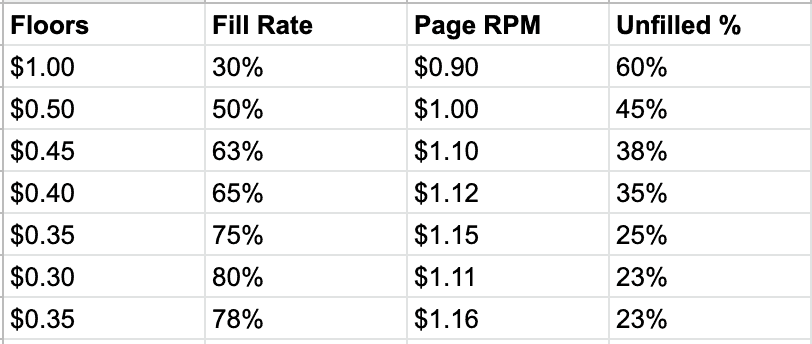
#2 – Setup new deals with a lower price point
Private Auctions, particularly in Ad Exchange is not a guarantee of buy. It’s time to negotiate with season-appropriate terms.
Run a 2-week worth of data (Q1, not Q4) and check the CPM levels for your top geographical locations. Go more granular if you’d like to set up separate deals for different parts of your inventory (e.g. by geo, by ad unit). Depending on the average CPMs you’re getting, inflate it 50%-100% higher.
For example, you’re getting an average CPM of $3.00, inflating it by 50% means:
$3.00 x 1.50 = $4.50
Create a new Private Auction with “Q1” or “1st Quarter” in the deal name. When Buyers see your offer, they see which time of the year it is for, and most likely catch attention. Set the end date to March 31st.

#3 – More ad sizes
Make your ad units flexible so more sizes become eligible to serve and compete in the auction. When adding sizes, go for the high paying ones, depending on the space where the ad unit is deployed. For example, your ad spot for a 728×90 unit right now may serve 728×250 as well, a 970×90 can serve 970×250 too.
When modifying ad unit sizes, don’t forget to:


#4 – Revisit rules/blocking/protections
This might be the time to loosen a little bit. Remove some blocking rules that have a huge impact on demand. For example, you have the category ‘Beauty and Personal Care’ blocked, go explore more subcategories and only block the ones that you particularly won’t show on your site.

#5 – Enable other Native styles
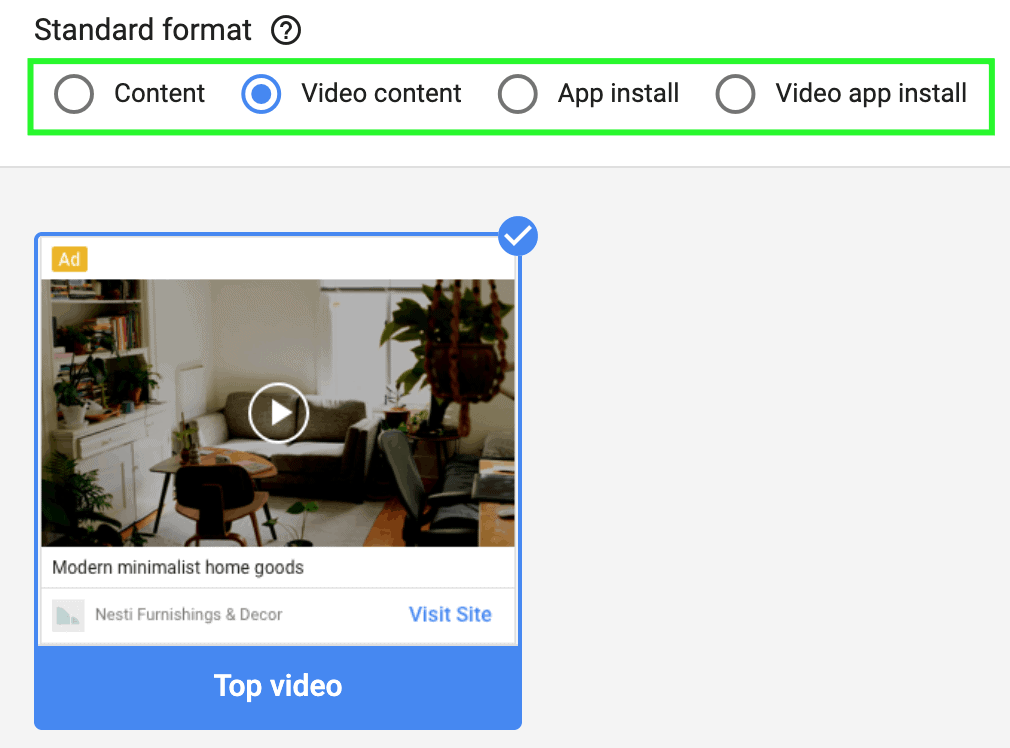
Add another Native style eligible for the size you choose. Video Content, in particular, performs well compared to other formats, but you’ll have to choose only one ad unit max per page where it can serve. If not, you might end up getting video ads all over the page and everything slows down.
#6 – Line item settings – Frequency Caps, Targeting

Revisit your line item Frequency Caps if there’s any room for adjustment. Depending on the situation (i.e. agreement with the Ad Network), increase the frequency or have it removed completely.
If you are currently targeting a few geographic locations or device categories, check if there’s an opportunity to expand.
#7 – Adblock monetization
If you haven’t explored this low hanging fruit yet, we recommend partnering with UpONit. If you are a MonetizeMore publisher, we can have this easily turned on for you. Running this tech means you continue serving ads even on AdBlock users. Ad quality is ensured so only non-intrusive, standard display and no videos can serve.

#8 – Other ad formats
Pushdowns, sticky ads, skins, expandable in-content, scroller — the list goes on. Partner with ad networks that support the format you and your users can tolerate. These non-standard ads are more obtrusive but potentially pay higher CPMs.
#9 – Super Bowl, Valentine’s Day, President’s Day Sale
Take advantage of these events/holidays when advertisers shell out more advertising money than the rest of the days in the first quarter. Depending on your traffic acquisition strategies, you might want to get your timing spot-on:
We also recommend avoiding making major changes on your site during these days.
Months: April, May, and June
General ad RPM performance for the quarter: Q2 is often a quarter of high ad RPMs as advertisers try to spend and receive all the ad impressions they planned for.
#1 – Start increasing CPM floors
Start changing slowly by $0.02 increments/decrements. Observe how buyers react which is evidenced by your fill rate and page RPM. If they continue to fill the ad requests given the floor set, keep increasing.
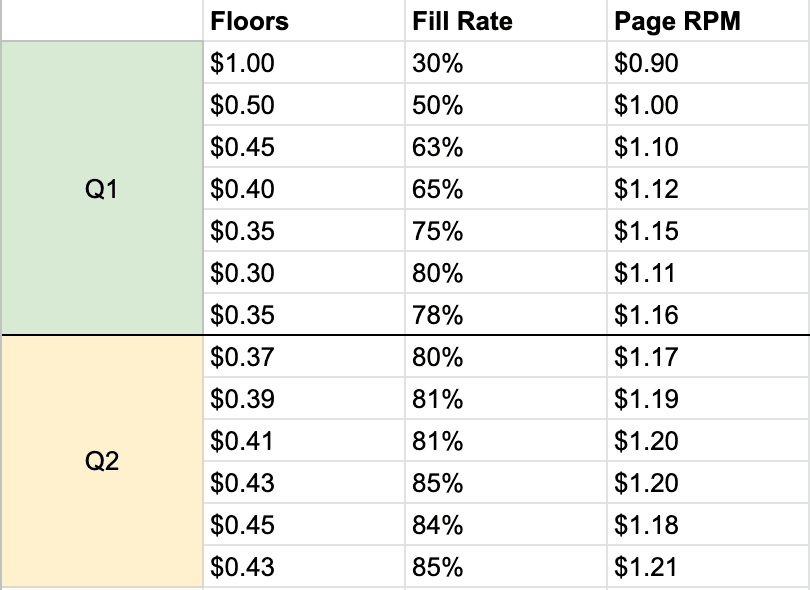
#2 – Clean up ad sizes
Breakdown your report by Ad Unit > Ad sizes, then start weeding out the least performing ones. Pay attention to the CPM and Viewability %.
#3 – Renegotiate deals
You dropped your prices in Q1, and it’s time to bump it up. This time, set your end date to June 30th and don’t forget to mention “Q2” or “2nd Quarter” in your deal name. To get a better sense of what you’re getting in terms of average CPM in Q2, wait until the 4th week of April then generate your report.

Depending on how much you are getting on average, inflate it by 100%-150%. For example, an average CPM of $2.00, inflating it by 150% means:
$2.00 x (2 x 1.5) = $5.00
#4 – Ad formats worth keeping
If there’s any ad format you enabled for the sole purpose of salvaging the dwindling revenues in Q1, assess if it’s worth keeping. To keep a good reputation to the advertisers, remember to give priority to Viewability %. If you have any obtrusive ad format that tends to cover the page content and negatively impacts other ad units, revisit your strategy.
It’s tempting to keep them at times because they pay higher CPMs but if you consider the long-term effect, your other ad units might not recover from lower bids because some advertisers have blacklisted the domain due to low viewability.
#5 – Mother’s Day, Memorial Day, Father’s Day, Memorial Day
Avoid making major changes on your site on the following dates or at least anything that could potentially cause technical issues:
These are also important dates for your traffic acquisition as advertising spend goes up.
Months: July, August, and September
General ad RPM performance for the quarter: In Q3, publishers can experience lower RPMs due to advertiser budgets being adjusted and planning for the Q4 season. The best time to launch this is
#1 – Reduce CPM floors in July, Increase by mid-August
Don’t be surprised when you see July numbers dropping like crazy. In most cases, it’s even worse than the decline you see in Q1, but it doesn’t last as long. Once advertising budgets are established, CPMs recover again around mid-August.
In July, until around the first two weeks of August, readjust your CPM floors across different demand partners to keep a stable fill rate across the board. By mid-August, start increasing for Q3. Avoid aggressive changes. Try going by $0.05 increments or decrements when adjusting floors.
#2 – Ad Placement Optimization
You are now gearing up for the most anticipated Q4 and should there be major changes that need to be deployed, now is the right time and not cram come Q4.
Ad Spots. Optimize your ad placements based on their Viewability %. Your goal is to put your ads on spots where your users are likely to focus their attention. Start by asking yourself: what do users do the moment they land on the page? Your answer to this question tells you to put that advertisement there.
Ad sizes and ad formats. Running only the high paying ad sizes is a good strategy for Q4. If you need to run non-standard ad formats, only allow those that won’t cover or make other ad units non-viewable. Here is the list of recommended sizes per device:
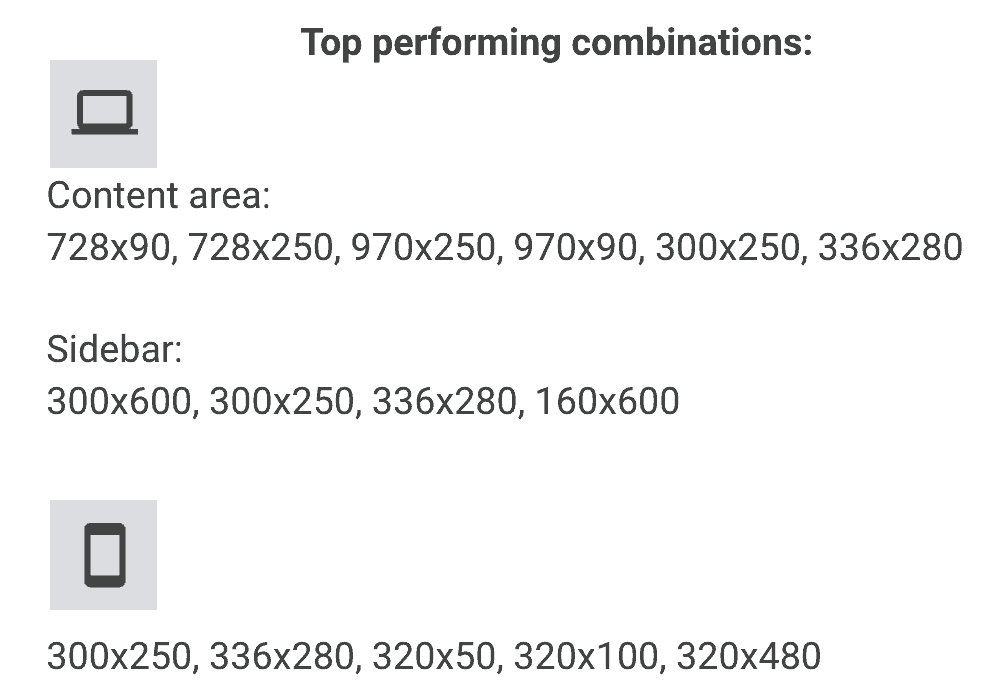
#3 – Managed Demand Deals
Managed Demand refers to all the ad networks running on your inventory outside of AdExchange/AdSense dynamic allocation and outside of Header Bidding. This is the perfect time to ask your ad representatives if they can offer a flat CPM deal at 100% fill. Don’t confuse this with “CPM floors”, the latter means it’s not guaranteed and they will only passback if they can’t meet the floor.
Here’s a sample scenario — you put Demand Partner A @ $2.00 priority in your stack because they promised a CPM floor of $2.00. When an ad request came in, their highest available bid was only $1.50 which is below the floor, so they passed back to Demand Partner B, and you ended up earning $1.25 for the impression served. What went wrong? You just gave this demand partner the impression it didn’t deserve.
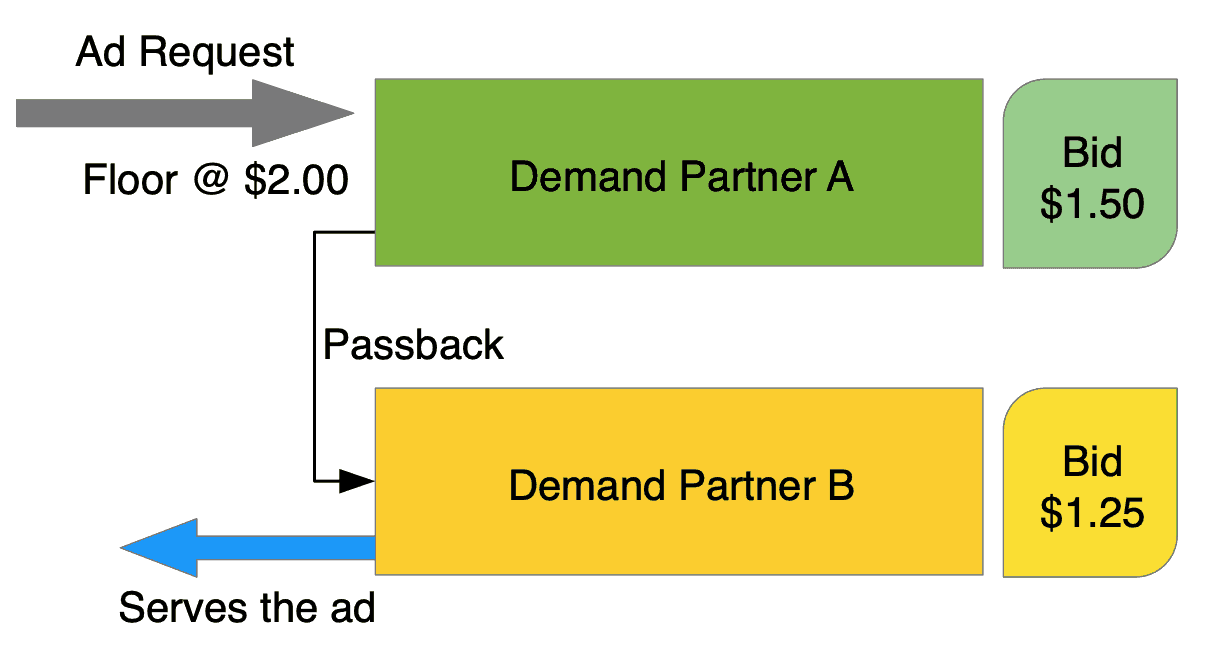
With “Guaranteed CPM at 100% fill”, they will pay you the rate agreed upon for every ad request they won in the auction. This is the type of deal you should go for, if possible.

#4 – 4th of July, Labor Day
Ad spend is expected to increase on these holidays, so keep your site in good shape and make sure there are no technical interruptions.
Months: October, November, and December
General ad RPM performance for the quarter: Q4 is usually the highest month of ad RPMs for publishers as Black Friday and the Christmas season takes place. Advertisers want to reach consumers willing to spend money.
#1 – Closely monitor performance and adjust CPM floors
This is most likely the perfect time to start increasing your CPM floors further. Depending on what you’re getting on average, set your floor by $0.10 increments or decrements, paying close attention to your fill rates.
#2 – Create a Private Auction for Q4
Depending on how much you are getting on average, inflate it by 200-300%. For example, an average CPM of $2.00, inflating it by 300% means:
$2.00 + ($2 x 3) = $8.00
Raising the bar high for Q4 is to set a fair game. You wouldn’t want Private Auction buyers to get priority when you have a higher bid waiting in the Open Auction.
#3 – Explore the opportunity to scale deals with Managed Demand partners
Check with your ad representative if they have some room to expand the partnership. For example, you’re only targeting mobile right now, ask if you can expand to desktop as well. If you’re targeting a few geographical locations, see if you can target more.
#4 – Huge Holidays
Thanksgiving, Black Friday, Christmas, New Year, they’re all here! Keep your site up and running, with no outages. Period. If you’re buying traffic, allocate your budget properly to send all those visitors at the right time.
#5 – Prepare for the drop in Q1
Sorry to reveal the bad news, but at the end of Q4, especially in the last two weeks of December, it is also the time when you start preparing for the impending drop in Q1. Expect ad networks to start changing the agreement effective in the first few days of January. Check our Q1 tips above and gear up!
Be sure to read more about how to prepare for Black Friday here: https://www.monetizemore.com/blog/how-black-friday-q4-impact-ad-earnings-prepare/
Additional tips include having seasonal content, partnering with the right ad network, running header bidding, and negotiating for direct deals.
You can read more about our holiday optimization strategy here: https://www.monetizemore.com/blog/maximize-revenue-holiday-season/.
Now you’re ready to face any quarter! Optimizing your ad revenues and staying on top of seasonal trends can be hard work. Why not focus on what you do best and let the ad optimization experts manage your ads for you? We’ll adjust and optimize your ads no matter the season and help you to maximize ad revenue! Sign up for a Premium account at MonetizeMore today!

With over seven years at the forefront of programmatic advertising, Aleesha is a renowned Ad-Tech expert, blending innovative strategies with cutting-edge technology. Her insights have reshaped programmatic advertising, leading to groundbreaking campaigns and 10X ROI increases for publishers and global brands. She believes in setting new standards in dynamic ad targeting and optimization.
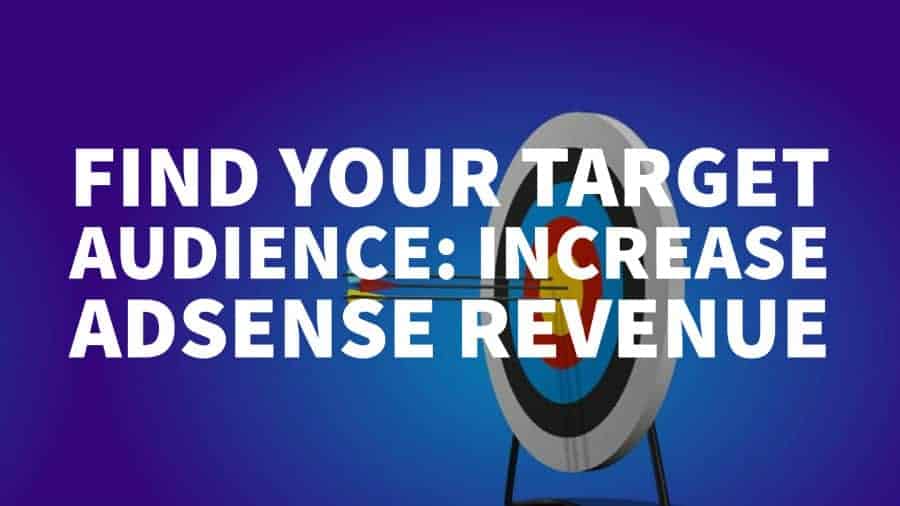
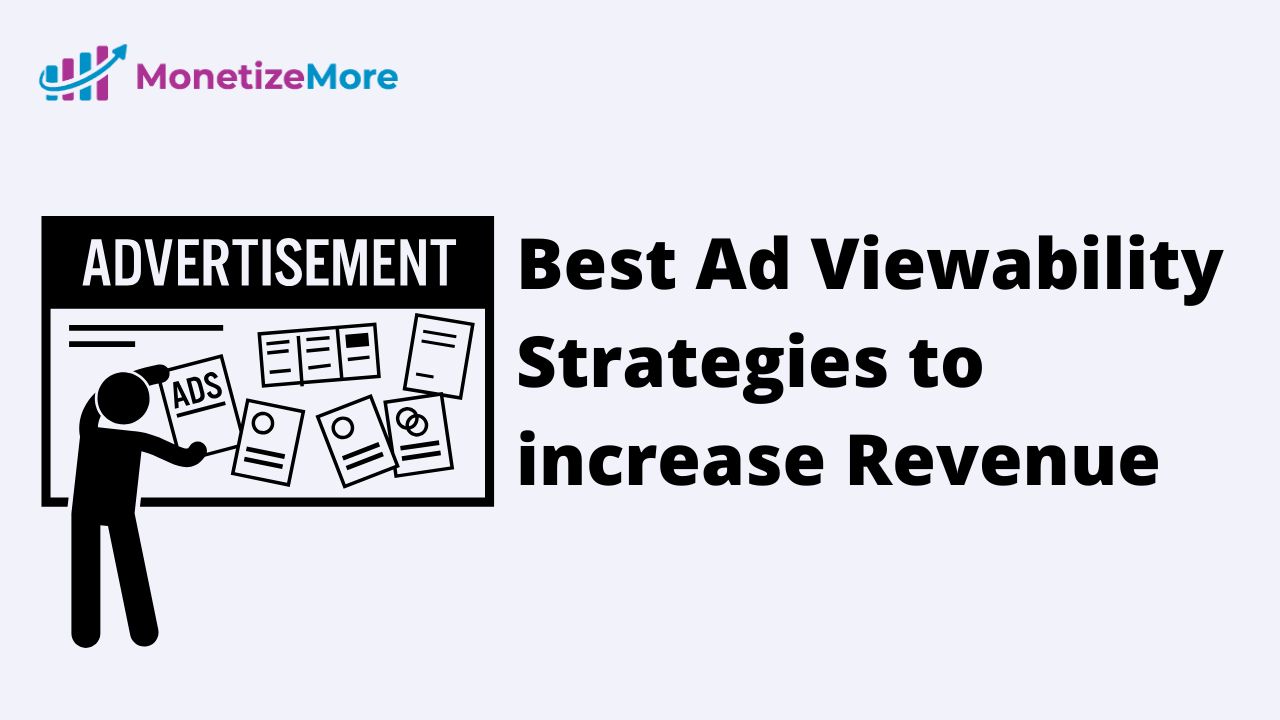
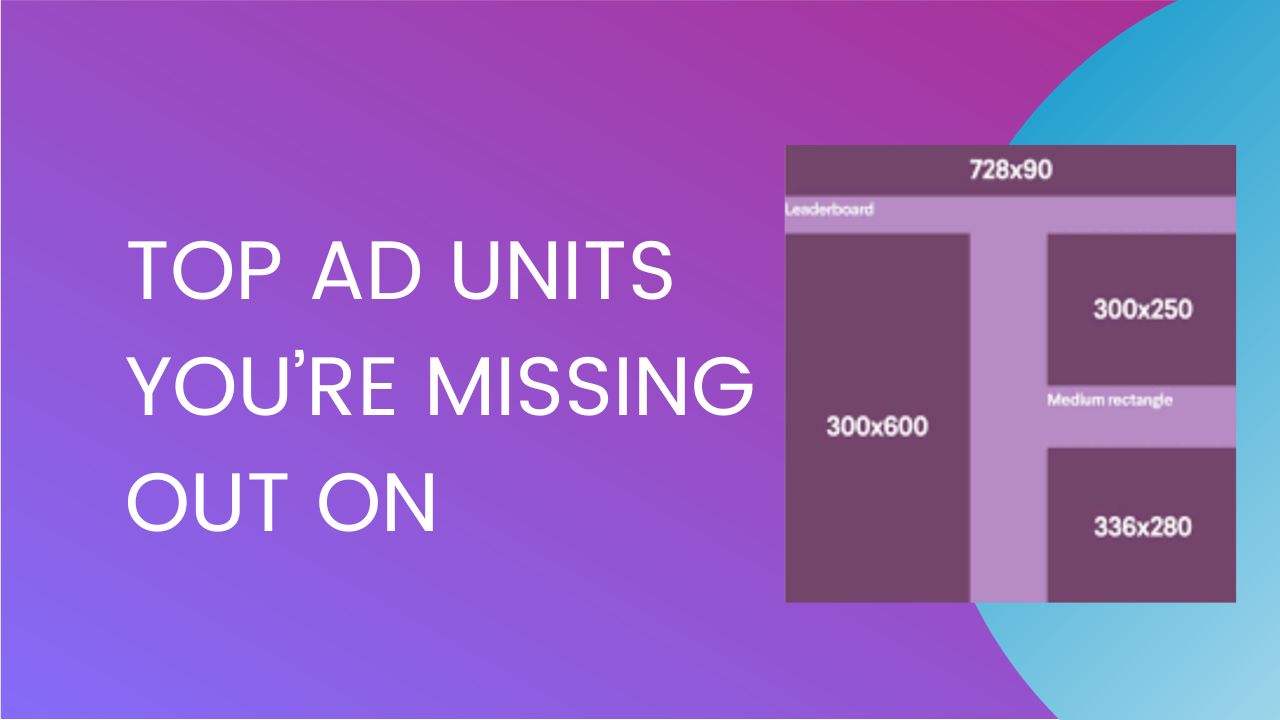
10X your ad revenue with our award-winning solutions.